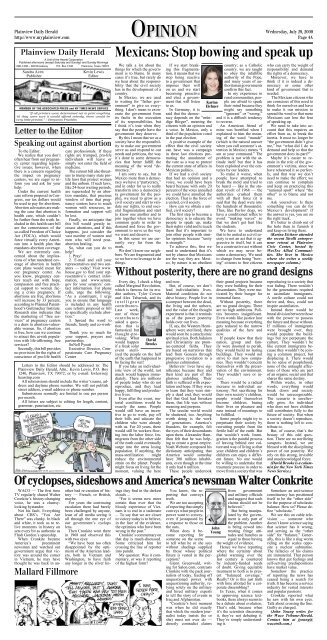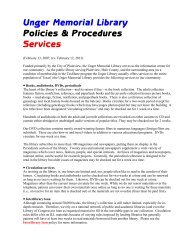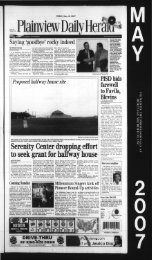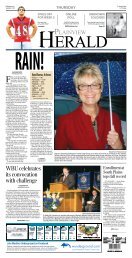7-29-09 Wednesday News.indd - The Unger Memorial Library ...
7-29-09 Wednesday News.indd - The Unger Memorial Library ...
7-29-09 Wednesday News.indd - The Unger Memorial Library ...
You also want an ePaper? Increase the reach of your titles
YUMPU automatically turns print PDFs into web optimized ePapers that Google loves.
Page 4A - <strong>Wednesday</strong>, July <strong>29</strong>, 20<strong>09</strong> - Plainview Daily Herald http://www.MyPlainview.com<br />
Plainview Daily Herald<br />
http://www.myplainview.com<br />
Plainview Daily Herald<br />
A Unit of of <strong>The</strong> the Hearst Corporation<br />
Published afternoons (except Saturday and and Sunnday) Sunday) and Sunday Mornings. Mornings<br />
<strong>29</strong>6-1300 – 820 Broadway P.O. Box 1240 Plainview, Texas 79072<br />
Sandra Aven Kevin Lewis<br />
Publisher Editor<br />
Sandra Aven, Publisher Danny Andrews, Editor<br />
James Thomas, Publisher Emeritus<br />
MEMBER OF THE ASSOCIATED PRESS and NY TIMES NEWS SERVICE<br />
“If all printers were determined not to print anything<br />
‘til they were sure it would offend nobody, there would be<br />
very little printed.” – Benjamin Franklin<br />
Letter to the Editor<br />
Speaking out against abortion<br />
To the Editor:<br />
We realize that you don’t<br />
often hear from our pregnancy<br />
center regarding legislative<br />
issues; however, when<br />
there is a concern regarding<br />
the impact on pregnancy<br />
centers, we are eager to inform<br />
you and ask for your<br />
help.<br />
Under the current health<br />
care reform proposal in Congress,<br />
our tax dollars would<br />
be used to pay for abortions.<br />
Abortion advocates are making<br />
the case that abortion is<br />
health care, which couldn’t<br />
be further from the truth. Included<br />
in this health care bill<br />
are the cornerstones of the<br />
so-called Freedom of Choice<br />
Act (FOCA), which would<br />
force virtually every American<br />
into a health plan that<br />
mandates abortion coverage.<br />
We are extremely concerned<br />
about the implications<br />
of what mandated coverage<br />
of abortion in health<br />
care plans would mean for<br />
our pregnancy center. As<br />
you know, pregnancy centers<br />
reach out with hope,<br />
compassion and free practical<br />
support to women facing<br />
a crisis pregnancy. If<br />
abortions are free, abortions<br />
will increase by 33 percent,<br />
according to Planned Parenthood’s<br />
Guttmacher Institute.<br />
Research also indicates that<br />
the marketing of “free services”<br />
at pregnancy centers<br />
is a draw to abortion-vulnerable<br />
women. So, if abortion<br />
is free, how can we continue<br />
to attract this at-risk population<br />
with life-affi rming, free<br />
services?<br />
Secondly, this bill provides<br />
no provision for the rights of<br />
conscience of pro-life health<br />
Mexicans: Stop bowing and speak up<br />
We talk a lot about the<br />
things for which the government<br />
is to blame. In many<br />
cases it’s true, but rarely do<br />
we hear about the responsibility<br />
that the civil society<br />
has in the development of a<br />
country.<br />
In Mexico, we are used<br />
to waiting for “father government”<br />
to give us everything.<br />
I don’t mean to exonerate<br />
the government from<br />
its faults in the execution<br />
of its responsibilities, but<br />
I think it’s true when they<br />
say sa that the people have the<br />
government go they deserve.<br />
By this I mean that we as a<br />
society so have the responsibil-<br />
ity to make our government<br />
serve us and respond to our<br />
needs and petitions, the way<br />
it’s done in some democracies<br />
that better fulfi ll the<br />
meaning of the word “democracy.”<br />
I am sorry to say, but in<br />
Mexico more than a democracy<br />
we have a “partycracy,”<br />
and in order for us to really<br />
transform into a democracy<br />
(a government for the people),<br />
we need to grow as a<br />
civil society and start to validate<br />
our rights, to end societal<br />
fragmentation and start<br />
to know one another and to<br />
join together when we have<br />
common goals in order to<br />
demand and force the government<br />
to serve us the way<br />
we want and deserve.<br />
In this sense we are currently<br />
very far from the<br />
mark.<br />
We don’t know our neighbors.<br />
We are fragmented and<br />
so we have no leverage to do<br />
things.<br />
If we start breaking<br />
this fragmentation,<br />
it means that we<br />
stop being reactive<br />
to a government that<br />
imposes their will<br />
on us and we start<br />
becoming proactive<br />
and elect a government<br />
that will listen<br />
to us.<br />
In Germany, it is<br />
said that the democracy<br />
depends on the “mündige<br />
Bürger”, meaning the<br />
citizens with an opinion and<br />
a voice. In Mexico, only a<br />
third of the population voted<br />
in the past election.<br />
A positive example of the<br />
effect that the civil society<br />
can have was a campaign<br />
in these last elections promoting<br />
the annulment of<br />
the vote as a way to protest<br />
the current state of affairs in<br />
Mexican politics.<br />
If we had a civil society<br />
that had an opinion and a<br />
voice, we could have been<br />
heard because with only 20<br />
percent of the votes annulled<br />
we could have annulled the<br />
election. That is the force of<br />
a united, civil society.<br />
How can we obtain a unifi<br />
ed, civil society?<br />
<strong>The</strong> fi rst step to become a<br />
democracy is to educate the<br />
people to speak up, make<br />
their rights valid and to teach<br />
them that it’s important to<br />
join other people with similar<br />
opinions because “unity<br />
is strength.”<br />
To achieve this, fi rst we<br />
need to understand that it’s<br />
not by chance that Mexicans<br />
are the way they are. Mexico,<br />
by nature is an obedient<br />
country; as a Catholic<br />
country, we are taught<br />
to obey the infallible<br />
authority of the Pope,<br />
and many years of authoritarian<br />
governments<br />
confi rm this fact.<br />
In my experience in<br />
rural communities, people<br />
are afraid to speak<br />
their mind because they<br />
might say something<br />
“ignorant” or “wrong,”<br />
and it is a diffi cult tendency<br />
to reverse.<br />
An American friend of<br />
mine was horrifi ed when I<br />
explained to him the meaning<br />
of the word “mande”<br />
(which is the natural answer<br />
when you call someone’s attention<br />
in Mexico) means “I<br />
am at your command.” <strong>The</strong><br />
problem is not with the attitude<br />
itself but that it has<br />
been exploited over the centuries<br />
by our leaders.<br />
To make it worse, when<br />
people have attempted to<br />
break the mold and tried to<br />
be heard — like in the student<br />
revolt of 1968 — the<br />
authorities crushed them<br />
with all their force (it is<br />
said that the dead were into<br />
the hundreds of thousands).<br />
Thus, like Pavlov dogs, we<br />
have a conditioned refl ex to<br />
avoid “making waves” so<br />
that we don’t get hurt like<br />
the students.<br />
We have to understand<br />
that to be united as a civil society<br />
is not an act that is aggressive<br />
in itself, but it can<br />
be a constructive act without<br />
which we may never become<br />
a democracy. We need<br />
to change from being “bowing”<br />
citizens to free citizens<br />
who can carry the weight of<br />
responsibility and demand<br />
the rights of a democracy.<br />
Moreover, we have to<br />
think if it is indeed a democracy<br />
or some other<br />
kind of government that is<br />
needed.<br />
<strong>The</strong> Mexican citizens who<br />
are conscious of this need to<br />
think for ourselves and have<br />
to make it our mission to<br />
spread the word so that more<br />
Mexicans can lose the fear<br />
of speaking up.<br />
We need to take into account<br />
that this requires an<br />
effort from us, to break the<br />
inertia. It must no longer be<br />
“the government didn’t give<br />
me,” but “what did I do to<br />
demand and help so that the<br />
government does its part?”<br />
Maybe it’s easier to remain<br />
in the role of the government’s<br />
victims, since we<br />
have rehearsed it so perfectly,<br />
and that way we don’t<br />
need to make the effort; we<br />
can continue to complain<br />
and keep on practicing this<br />
“national sport” where “the<br />
other” is to blame and not<br />
me.<br />
Ask yourselves: Is there<br />
something you can do for<br />
Mexico’s development? If<br />
the answer is yes, you are on<br />
the right track.<br />
It’s better to climb out of<br />
the hole than to furnish it<br />
and keep on living there.<br />
(Karina Eichner attended<br />
the recent Sirolli entrepreneur<br />
retreat at Plainview<br />
Civic Center, hosted by<br />
WesTex Allied Communities.<br />
She lives in Mexico<br />
where she writes a weekly<br />
newspaper column.)<br />
Without posterity, there are no grand designs<br />
Every day, I check a blog<br />
called Marginal Revolution,<br />
which is famous for its erudite<br />
authors, Tyler Cowen<br />
and Alex Tabarrok, and its<br />
intelligent<br />
contributors.<br />
Last week,<br />
one of those<br />
contributors<br />
asked a question<br />
that is<br />
fantastical but<br />
thought-pro-<br />
voking: What<br />
would happen<br />
if a freak solar<br />
event steril-<br />
ized the people on the half<br />
of the earth that happened to<br />
be facing the sun?<br />
If you take an individualistic<br />
view of the world, not<br />
much would happen immediately.<br />
<strong>The</strong>re are millions<br />
of people today who do not<br />
reproduce, and they lead<br />
happy, fulfi lling and productive<br />
lives.<br />
Even after the event, material<br />
conditions would be<br />
exactly the same. People<br />
would still have an incentive<br />
to go to work, pay off<br />
their bills and educate the<br />
children who were already<br />
with us. For 20 years, there<br />
would still be workers fl owing<br />
into the labor force. Immigrants<br />
from the other side<br />
of the earth could eventually<br />
surge into the areas losing<br />
population. If anything, the<br />
mass-sterilization might<br />
reduce the environmental<br />
strain on the planet. People<br />
might focus on living for the<br />
moment, valuing the here<br />
and now.<br />
But, of course, we don’t<br />
lead individualistic lives.<br />
Material conditions do not<br />
drive history. People live in<br />
a compact between the dead,<br />
the living and the unborn,<br />
and the value of the thought<br />
experiment is that it reminds<br />
us of the power posterity<br />
holds over our lives.<br />
If, say, the Western Hemisphere<br />
were sterilized, there<br />
would soon be a cataclysmic<br />
spiritual crisis. Both Judaism<br />
and Christianity are promise-centered<br />
faiths. <strong>The</strong>y<br />
are based on narratives that<br />
lead from Genesis through<br />
progressive revelation to a<br />
glorious culmination.<br />
Believers’ lives have signifi<br />
cance because they and<br />
their kind are part of this<br />
glorious unfolding. <strong>The</strong>ir<br />
faith is suffused with expectation<br />
and hope. If they were<br />
to learn that they were simply<br />
a dead end, they would<br />
feel that God had forsaken<br />
them, that life was without<br />
meaning and purpose.<br />
<strong>The</strong> secular world would<br />
be shattered, too. Anything<br />
worth doing is the work<br />
of generations. America’s<br />
founders, for example, felt<br />
the eyes of their descendants<br />
upon them. Alexander Hamilton<br />
felt that he was helping<br />
to create a great empire.<br />
Noah Webster composed his<br />
dictionary anticipating that<br />
America would someday<br />
have 300 million inhabitants,<br />
even though at the time<br />
it only had 6 million.<br />
<strong>The</strong>se people undertook<br />
their grand projects because<br />
they were building for their<br />
descendants. <strong>The</strong>y were motivated<br />
by their hunger for<br />
immortal fame.<br />
Without posterity, there<br />
are no grand designs. <strong>The</strong>re<br />
are no high ambitions. Politics<br />
becomes insignifi cant.<br />
Even words like justice lose<br />
meaning because everything<br />
gets reduced to the narrow<br />
qualities of the here and<br />
now.<br />
If people knew that their<br />
nation, group and family<br />
were doomed to perish,<br />
they would build no lasting<br />
buildings. <strong>The</strong>y would not<br />
strive to start new companies.<br />
<strong>The</strong>y wouldn’t concern<br />
themselves with the preservation<br />
of the environment.<br />
<strong>The</strong>y wouldn’t save or invest.<br />
<strong>The</strong>re would be a radical<br />
increase in individual autonomy.<br />
Not sacrifi cing for<br />
their own society’s children,<br />
people would themselves<br />
become children, basing<br />
their lives on pleasure and<br />
ease instead of meanings to<br />
be fulfi lled.<br />
Some people might try to<br />
perpetuate their society by<br />
recruiting people from the<br />
fertile half of the earth. But<br />
that wouldn’t work. Immigration<br />
is the painful process<br />
of leaving behind one culture<br />
and way of living so that<br />
your children and children’s<br />
children can enjoy a different<br />
future. No one would<br />
be willing to undertake that<br />
traumatic process in order to<br />
move from a society that was<br />
reproducing to a society that<br />
was fading. <strong>The</strong>re wouldn’t<br />
be the generations required<br />
to assimilate immigrants.<br />
A sterile culture could not<br />
thrive and, thus, could not<br />
inspire assimilation.<br />
Instead there would be<br />
brutal division between those<br />
with the power to possess<br />
the future and those without.<br />
If millions of immigrants<br />
were brought over, they<br />
would populate the buildings<br />
but not perpetuate the<br />
culture. <strong>The</strong>y wouldn’t be<br />
like current immigrants because<br />
they wouldn’t be joining<br />
a common project, but<br />
displacing it. <strong>The</strong>re would<br />
be no sense of peoplehood,<br />
none of the untaught affections<br />
of those who are part<br />
of an organic social unit that<br />
shares the same destiny.<br />
Within weeks, in other<br />
words, everything would<br />
break down and society<br />
would be unrecognizable.<br />
<strong>The</strong> scenario is unrelievedly<br />
grim. An individual<br />
who does not have children<br />
still contributes fully to the<br />
future of society. But when<br />
a society doesn’t reproduce,<br />
there is nothing left to contribute<br />
to.<br />
But, of course, that’s the<br />
beauty of this odd question.<br />
<strong>The</strong>re are no sterilizing<br />
sunspots. Instead, we are<br />
blessed with the disciplining<br />
power of our posterity. We<br />
rely on this strong, invisible<br />
and unacknowledged force.<br />
(David Brooks is a columnist<br />
for the New York Times<br />
<strong>News</strong> Service.)<br />
Of cyclopses, sideshows and America’s newsman Walter Conkrite<br />
WACO — <strong>The</strong> fi rst time<br />
TV regularly shared Walter<br />
Cronkite’s history-changing<br />
voice, he was a clumsylooking<br />
bystander.<br />
Not his fault. Everything<br />
about CBS’s “You Are<br />
<strong>The</strong>re” was clunky. In black<br />
and white, it took us to relive<br />
moments in history on<br />
sets every bit as authentic as<br />
Flash Gordon’s spaceship.<br />
When Cronkite became<br />
America’s preeminent<br />
newsman and watched our<br />
government argue that victory<br />
was around the corner<br />
in Vietnam, he may have<br />
thought he was back in an-<br />
Mallard Fillmore<br />
care professionals. If these<br />
rights are trumped, pro-life<br />
individuals will leave or<br />
simply not enter the fi eld of<br />
medicine.<br />
<strong>The</strong> current bill also threatens<br />
to trump many state prolife<br />
laws that protect women<br />
and the unborn. If such laws,<br />
like 24-hour waiting periods,<br />
are superseded by an abortion<br />
mandate, that precious<br />
window of time that pregnancy<br />
centers have to reach<br />
women with resources, information<br />
and support will<br />
be lost.<br />
Finally, we anticipate that<br />
this bill would greatly increase<br />
abortions, and if this<br />
happens, just consider the<br />
vast number of women and<br />
men who will need postabortion<br />
healing.<br />
So, what can you do to<br />
help?<br />
1. Pray!<br />
2. E-mail and call your<br />
representatives and two senators<br />
— today! Visit www.<br />
house.gov to fi nd your representative’s<br />
contact information,<br />
and www.senate.<br />
gov for your senators’ contact<br />
information. For phone<br />
calls, urge the following:<br />
“As a constituent, I urge<br />
you to ensure that language<br />
is included in any health<br />
care reform proposal or bill<br />
to specifi cally exclude abortion.”<br />
3. Spread the word to<br />
friends, family and co-workers.<br />
Thank you so much for<br />
your support, prayers and<br />
partnership.<br />
SuNell Pyeatt<br />
Executive Director, Compassionate<br />
Care Pregnancy<br />
Center<br />
Letters to the Editor should be addressed to: <strong>The</strong><br />
Plainview Daily Herald, Attn.: Kevin Lewis, P.O. Box<br />
1240, Plainview, TX 79072; or by e-mail: kwlewis@<br />
hearstnp.com<br />
All submissions should include the writer’s name, address<br />
and daytime phone number. We will not publish<br />
street address, e-mail address or phone number.<br />
Submissions normally are limited to one per person<br />
per month.<br />
All letters are subject to editing for length, content,<br />
grammar, punctuation, etc.<br />
other bad re-creation of history<br />
— French, or British,<br />
maybe.<br />
For years the continuing<br />
escalation there had barely<br />
been challenged by anyone,<br />
least of all media seeing it<br />
all through the one eye of<br />
our government’s cyclops<br />
lens.<br />
<strong>The</strong>n Cronkite went there<br />
in 1968 and observed this<br />
with two eyes:<br />
“We have been too often<br />
disappointed by the optimism<br />
of the American leaders,<br />
both in Vietnam and<br />
Washington, to have faith<br />
any longer in the silver lin-<br />
OPINION<br />
David<br />
Brooks<br />
ings they fi nd in the darkest<br />
clouds ...<br />
“For it seems now more<br />
certain than ever that the<br />
bloody experience of Vietnam<br />
is to end in a stalemate<br />
... To say that we are closer<br />
to victory today is to believe,<br />
in the face of the evidence,<br />
the optimists who have been<br />
wrong in the past.”<br />
Cronkite’s commentary on<br />
that day is much-discussed.<br />
Some criticized him for<br />
crossing the line of reporter<br />
into pundit.<br />
My question: Was it commentary,<br />
or was it reporting<br />
of the highest form?<br />
Karina<br />
Eichner<br />
You know, the reporting<br />
that conveys<br />
truth.<br />
We are too accepting<br />
of reporting that simply<br />
conveys what people in<br />
power want to convey,<br />
even if juxtaposed by<br />
a response to those on<br />
the outs.<br />
When does it become<br />
reporting for<br />
someone on the scene<br />
to tell what he or she sees<br />
without shadings supplied<br />
by those whose political<br />
future is vested in the perception?<br />
Glenn Greenwald, writing<br />
for Salon.com, contrasts<br />
Cronkite with the pack journalists<br />
of today, feeding off<br />
unquestioned power with<br />
unquestioning authority, relying<br />
solely on the military<br />
and hired military experts<br />
to tell the story of events in<br />
Iraq and Afghanistan.<br />
“Cronkite’s best moment<br />
was when he did exactly<br />
that which the modern journalist<br />
today insists (he or<br />
she) must not ever do —<br />
directly contradict claims<br />
John<br />
Young<br />
from government<br />
and military offi cials<br />
and suggest that such<br />
claims should not be<br />
believed.”<br />
But being manipulated<br />
by the government<br />
is only part of<br />
the problem. Another<br />
is being cowed into<br />
treating fringe attitudes<br />
and hunches as<br />
equal to those having<br />
the weight of evidence.<br />
Hence we have reporting<br />
where the certainty about<br />
global warming over the<br />
last century is countered<br />
by industry-funded seeds<br />
of doubt. Giving equitable<br />
treatment to both is to present<br />
“balanced coverage.”<br />
Really? Or is this just truth<br />
with time allotted for a corporate<br />
dissembling?<br />
In Texas, when it comes<br />
to approving science textbooks,<br />
there always seems to<br />
be a debate about evolution.<br />
That’s odd, because when<br />
it’s the scientists discussing<br />
it, they’re not debating it.<br />
<strong>The</strong>y’re simply understanding<br />
it.<br />
<strong>Wednesday</strong>, July <strong>29</strong>, 20<strong>09</strong><br />
Page 4A<br />
Somehow an anti-science<br />
constituency has positioned<br />
itself to be the “other side”<br />
for the purpose of scholastic<br />
balance. How so? Please defi<br />
ne “scholastic.”<br />
We see this on cable television<br />
— someone who<br />
doesn’t know science saying<br />
that science has it wrong,<br />
and serving as the “other<br />
side” for “balance.” Generally,<br />
this is like a slug worm<br />
riding on the scales opposite<br />
a nuclear submarine.<br />
<strong>The</strong> fallacies of his claims<br />
are immaterial. That person<br />
knows that gut feelings and<br />
self-serving predispositions<br />
have market value.<br />
Somehow the practice<br />
of reporting the news has<br />
ceased being a search for<br />
truth. It has become a service<br />
industry for vested interests<br />
and popular passions.<br />
Cronkite reported what<br />
he saw with his own eyes.<br />
Talk about crossing the line.<br />
Guilty as charged.<br />
(John Young writes for<br />
the Waco Tribune-Herald.<br />
Contact him at jyoung@<br />
wacotrib.com.)
















